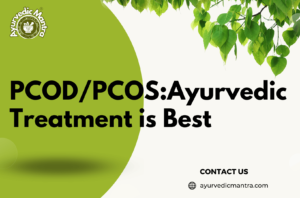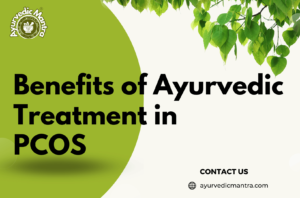
PCOD/PCOS: Ayurvedic Treatment is Best
Introduction Polycystic Ovary Disorder (PCOD) or Polycystic Ovary Syndrome (PCOS) is a common endocrine disorder affecting millions of women worldwide. It leads to hormonal imbalances,

Polycystic Ovarian Syndrome (PCOS) is a complex hormonal disorder affecting many women worldwide. While it is commonly known for its reproductive implications, many are unaware of the profound impact PCOS can have on the skin. This comprehensive guide delves into the relationship between PCOS and skin health, offering insights into the underlying causes and effective management strategies.
PCOS can wreak havoc on the skin due to its influence on hormone levels, particularly androgens like testosterone. Elevated androgen levels can lead to various skin problems, including:
The overproduction of androgens in PCOS can stimulate the sebaceous glands, producing excess oil and clogged pores. This often leads to stubborn acne, which can be emotionally distressing for individuals already dealing with PCOS.
Unwanted facial and body hair, known as hirsutism, is another distressing symptom caused by elevated androgen levels. This can lead to decreased self-esteem and a search for effective hair removal methods.
Thinning of the hair or male-pattern baldness is also associated with PCOS, further highlighting the hormone-related impact on the body.
PCOS can also manifest on the skin through a condition called acanthosis nigricans. This is characterized by dark, thickened patches of skin, often appearing in skin folds such as the neck, armpits, or groin. Insulin resistance, a common factor in PCOS, is believed to contribute to this skin condition.
While dealing with PCOS-related skin problems can be challenging, several strategies can help manage and alleviate these concerns:
A proper skincare routine tailored to your skin type can work wonders. Regular cleansing, exfoliating, and moisturizing can help control excess oil and prevent acne breakouts.
Consulting a medical professional to regulate hormone levels can significantly impact skin health. Hormonal therapies and birth control pills are often prescribed to manage androgen levels.
Since insulin resistance is closely associated with PCOS, managing blood sugar levels through a balanced diet and exercise can improve skin conditions like acanthosis nigricans.
Hair removal techniques such as shaving, waxing, threading, and laser treatments can relieve and boost confidence in managing hirsutism.
Dealing with PCOS and its impact on the skin can take an emotional toll. Practicing self-care, maintaining a positive self-image, and seeking support from healthcare professionals or support groups is crucial.
Polycystic Ovarian Syndrome is a complex condition that extends beyond its reproductive implications, affecting various aspects of a woman’s health, including skin. Understanding the connection between PCOS and skin problems is the first step toward effective management. Individuals with PCOS can regain their confidence and enjoy healthier, clearer skin by implementing a holistic approach that includes skincare, hormone regulation, and self-care.
In conclusion, addressing PCOS-related skin concerns requires a multi-faceted approach that considers those affected’s physiological and emotional well-being. Through informed strategies and professional guidance, individuals can navigate the challenges posed by PCOS and embrace their inner and outer beauty.
Polycystic Ovarian Syndrome (PCOS) is a hormonal disorder that predominantly affects women of reproductive age. Irregular periods, elevated androgen levels, and multiple cysts on the ovaries characterize it. These hormonal imbalances can trigger various skin issues, including acne, hirsutism (excess hair growth), and alopecia (hair loss).
A2: PCOS can lead to higher levels of androgens, particularly testosterone. These androgens stimulate the sebaceous glands, causing them to produce more oil. Excess oil can clog pores and create a favorable environment for bacteria, resulting in acne breakouts.
Hirsutism refers to the growth of coarse, dark hair on areas where men typically grow hair, such as the face, chest, and back. PCOS-induced hormonal imbalances, specifically elevated androgens, can lead to hirsutism in women, affecting their self-esteem and quality of life.
PCOS can contribute to hair thinning and male-pattern baldness (alopecia). Androgens, once again, play a significant role. Elevated levels of androgens can lead to hair follicle miniaturization and reduced hair growth.
Acanthosis nigricans is a skin condition characterized by dark, thickened patches of skin, often in skin folds. Insulin resistance, a common factor in PCOS, is believed to trigger this condition. The body’s response to insulin affects skin cells, leading to acanthosis nigricans.
Managing PCOS-related skin problems involves a multi-faceted approach:
Absolutely. A healthy lifestyle with a balanced diet, regular exercise, stress management, and adequate sleep can improve overall skin health for individuals with PCOS. A well-rounded approach can help regulate hormones, improve insulin sensitivity, and promote clearer skin.
Yes, it is possible. While PCOS-related skin issues can be challenging, a combination of effective skincare, medical interventions, and emotional support can significantly improve the appearance of the skin. Seeking professional guidance and practicing self-care can help individuals regain confidence and boost self-esteem.
Yes, several support groups, online communities, and resources are dedicated to helping individuals with PCOS manage their skin issues. These platforms provide a space for sharing experiences, seeking advice, and finding emotional support from others who are going through similar challenges.
Addressing PCOS-related skin problems is essential not only for aesthetic reasons but also for overall well-being. Skin issues caused by PCOS can impact an individual’s self-esteem, body image, and quality of life. Individuals can improve their physical appearance and emotional health by seeking appropriate treatments and adopting a holistic approach.

Introduction Polycystic Ovary Disorder (PCOD) or Polycystic Ovary Syndrome (PCOS) is a common endocrine disorder affecting millions of women worldwide. It leads to hormonal imbalances,

Introduction Losing weight is a journey that requires dedication, consistency, and self-care. While there are numerous weight loss techniques out there, not all of them

Polycystic Ovary Syndrome (PCOS) is a hormonal disorder that affects millions of women worldwide. It can lead to various health complications, such as irregular periods,

In recent years, Ayurveda, an ancient system of natural healing originating from India, has gained significant popularity as an alternative approach to treating various health

आजकल वजन बढ़ने और चर्बी की वृद्धि होने की समस्या एक आम समस्या बन गई है। बढ़ते वजन और अतिरिक्त चर्बी के कारण न केवल

प्रस्तावना: आजकल वजन बढ़ने और ओबेसिटी की समस्या एक आम समस्या बन गई है। बढ़ते वजन के कारण न केवल शारीरिक समस्याएं होती हैं, बल्कि
